Low-FODMAP
and Vegan
WHAT TO EAT WHEN YOU CANT EAT ANYTHINGJo Stepaniak, MSEd Library of Congress Cataloging-in-Publication Data
Library of Congress Cataloging-in-Publication Data Names: Stepaniak, Jo, author. Title: Low-FODMAP and vegan : what to eat when you cant eat anything / Jo Stepaniak, MSEd. Other titles: Low-Fermentable Oligosaccharides, Disaccharides, Monosaccharides and Polyols and vegan Description: Summertown, Tennessee : Book Publishing Company, [2016] | Includes index. Identifiers: LCCN 2016005668 (print) | LCCN 2016009816 (ebook) | ISBN 9781570673375 (pbk.) | ISBN 9781570678592 (e-book) Subjects: LCSH: Malabsorption syndromesDiet therapyRecipes. | Irritable colonDiet therapyRecipes. | Veganism.
Classification: LCC RC862.M3 S74 2016 (print) | LCC RC862.M3 (ebook) | DDC 641.5/631dc23 LC record available at http://lccn.loc.gov/2016005668 
| We chose to print this title on sustainably harvested paper stock certified by the Forest Stewardship Council, an independent auditor of responsible forestry practices. For more information, visit https://us.fsc.org. 2016 Jo Stepaniak All rights reserved. No portion of this book may be reproduced by any means whatsoever, except for brief quotations in reviews, without written permission from the publisher. |  |
Front cover: Bliss Bowls,Back cover: Cream of Carrot and Parsnip Soup, ;Eggplant and Spinach Bolognese with Pasta, Photography and food styling: Alan Roettinger Cover and interior design: John Wincek Stock photography: 123 RF Printed in Canada Book Publishing Company PO Box 99 Summertown, TN 38483 888-260-8458 bookpubco.com ISBN: 978-1-57067-337-5 Disclaimer: The information in this book is presented for educational purposes only. 21 20 19 18 17 16 1 2 3 4 5 6 7 8 9
CONTENTS
ACKNOWLEDGMENTS
My deepest gratitude to Book Publishing Company for being innovators in ethical publishing, and especially to Bob and Cynthia Holzapfel for recognizing the need for a book that addresses functional digestive disorders and vegan diets. 21 20 19 18 17 16 1 2 3 4 5 6 7 8 9
CONTENTS
ACKNOWLEDGMENTS
My deepest gratitude to Book Publishing Company for being innovators in ethical publishing, and especially to Bob and Cynthia Holzapfel for recognizing the need for a book that addresses functional digestive disorders and vegan diets.
Enormous thanks to chef Beverly Lynn Bennett for tirelessly testing a number of recipes in this book and contributing a few of her own specifically for it. Her suggestions, culinary expertise, and boundless generosity have been invaluable. I greatly appreciate the nutritional analyses done by cookbook author and recipe developer Laurie Sadowski, as well as her extremely helpful advice and constructive feedback. Many thanks to chef, cookbook author, and photographer Alan Roettinger for meticulously preparing, styling, and shooting the photos for this book, and to photographer Laura Look for her astute direction and oversight. Much gratitude to John Wincek for his infinite creativity and spectacular job with the cover and interior design. Im indebted to Sue Shepherd, PhD, Peter Gibson, MD, and all the amazing researchers and dieticians affiliated with the low-FODMAP diet project and app at Monash University in Australia.
Thank you to dietitians Kate Scarlata, RD/RDN, and Patsy Catsos, MS, RDN, LD, who have pioneered peer education in the United States about the low-FODMAP diet and also provide clinical support to people with IBS and other digestive issues. A deep bow of appreciation to Mark Pimentel, MD, director of the Gastrointestinal Motility Program and Laboratory at Cedars-Sinai Medical Center, for his ongoing commitment to find the causes of IBS and develop effective treatments. And, of course, Im ever grateful to the members of the vegan community and their selfless efforts to make our planet a more loving and compassionate home for all life. Finally, I extend my love and gratitude to my husband, Michael, who has not only patiently endured my digestive challenges but has also remained my champion, best friend, and intrepid taste tester.
INTRODUCTION
Nearly everyone who adopts a vegan diet, regardless of their reasons, rightfully expects to see improvements in their health. After all, eating more plant-based foods, especially whole, minimally processed foods, has been shown in study after study to benefit health in a vast number of ways.
Scout the web, go to a vegan festival, attend an animal rights conference, take a vegan nutrition course, read a vegan blog or book, or listen to a vegan podcast, and youll discover countless people who claim to have cured every ailment under the sun just by following a vegan diet. But what if you dont feel good when you become vegan? What if your health problems take a nosedive rather than resolve? Who can you turn to if you feel worse rather than better? Because of the well-deserved positive press that plant foods have received, its become almost heretical to disclose that you dont feel well on a vegan diet. And if you do speak up, your vegan friends and countless others on social media will no doubt be delighted to tell you exactly what youre doing wrong and how to fix it: adopt a raw diet; go oil-free; fast; juice more; eat fewer starches; eat more starches; eliminate grains; ditch gluten; get more fiber; avoid sugar; go low-carb; abstain from nuts; drink green smoothies. Consequently, its no surprise that most vegans who dont feel well are unwilling to talk about it, and its also no surprise that many of us privately harbor an enormous amount of guilt, shame, and embarrassment about our situation. We too wonder what were doing wrong. Why arent we among the majority of vegans who are thriving and feeling fabulous? Whats the matter with us? I became a vegetarian when I was a child, long before it was fashionable or commonplace.
And I became a vegan many decades ago, also long before it trended. I loved vegetables when I was little (yes, I was the nerdy kid who would rather eat spinach than dessert) and any food deemed healthy. And yet I never seemed to feel very good. I suffered from terrible stomachaches, headaches, and bowel issues, and rather than feel better when I became vegan, I actually felt worse. As an adult, I tried every approach under the sun to make the pain and gut problems go away: probiotics, prebiotics, a raw diet, a high-fiber diet, juicing, nutritional supplements, fiber supplements, fasting, going gluten-free, going oil-free, going fat-free, going sugar-free, going yeast-free, going nutritarian, eating fermented foods, following food combining, doing cleanses, trying elimination diets, you name it. I tried each of these methods not just briefly on a whim but for years (as I mentioned, Ive been vegan for many decades).
But absolutely nothing worked. In addition, I shuttled from doctor to doctor, trying to get a handle on what was wrong with me. I exercised. I ate well. I didnt smoke. I didnt drink alcohol or take drugs.
I meditated. I had meaningful work. I should have been feeling great, right? After rounds and rounds of tests, each doctor declared that I was fit and healthy and that I only had irritable bowel syndrome. Then they ushered me out of their offices, dismissing me with a flick of the wrist and a subtle smirk that implied I have patients with serious health issues. Stop bothering me. When youre vegan and have unrelenting IBS, its a pretty lonely and exasperating experience.


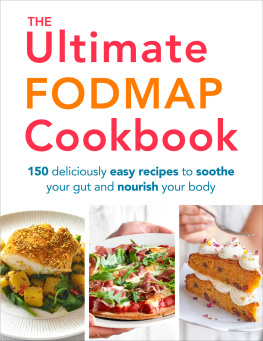
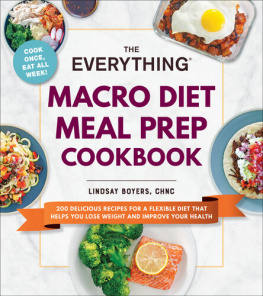
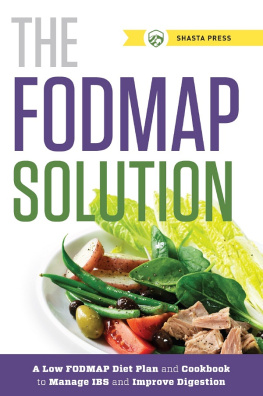
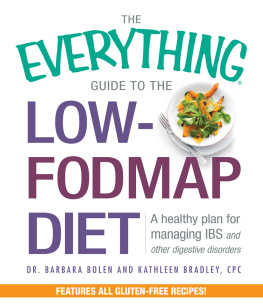
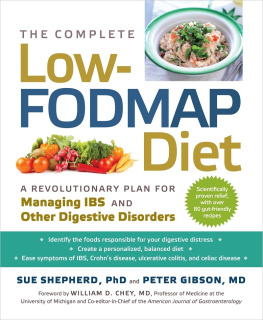
 Library of Congress Cataloging-in-Publication Data Names: Stepaniak, Jo, author. Title: Low-FODMAP and vegan : what to eat when you cant eat anything / Jo Stepaniak, MSEd. Other titles: Low-Fermentable Oligosaccharides, Disaccharides, Monosaccharides and Polyols and vegan Description: Summertown, Tennessee : Book Publishing Company, [2016] | Includes index. Identifiers: LCCN 2016005668 (print) | LCCN 2016009816 (ebook) | ISBN 9781570673375 (pbk.) | ISBN 9781570678592 (e-book) Subjects: LCSH: Malabsorption syndromesDiet therapyRecipes. | Irritable colonDiet therapyRecipes. | Veganism.
Library of Congress Cataloging-in-Publication Data Names: Stepaniak, Jo, author. Title: Low-FODMAP and vegan : what to eat when you cant eat anything / Jo Stepaniak, MSEd. Other titles: Low-Fermentable Oligosaccharides, Disaccharides, Monosaccharides and Polyols and vegan Description: Summertown, Tennessee : Book Publishing Company, [2016] | Includes index. Identifiers: LCCN 2016005668 (print) | LCCN 2016009816 (ebook) | ISBN 9781570673375 (pbk.) | ISBN 9781570678592 (e-book) Subjects: LCSH: Malabsorption syndromesDiet therapyRecipes. | Irritable colonDiet therapyRecipes. | Veganism. 
